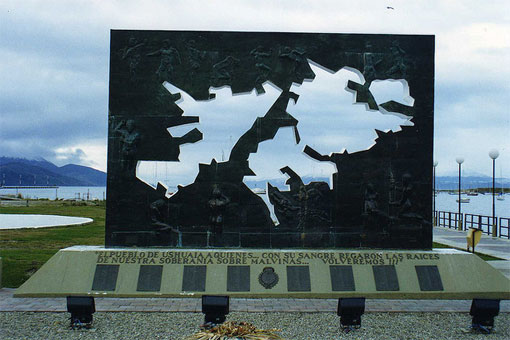Today marks the 30-year anniversary of the start of the 74-day Malvinas War. Although control of the islands is often seen as an issue of national pride, the Malvinas (known as the Falklands outside of Latin America) are also important geostrategic and economic assets.
Unfortunately, but not surprisingly, rhetoric over the islands’ status has yet again escalated in the lead up to Argentina and the United Kingdom marking the hostilities and the 900 soldiers (including three islanders) who died during the conflict.
The Malvinas are two small islands of 4,405 square miles (11,400 square kilometers) a mere 403 miles (650 kilometers) from the Argentine mainland. They remain sparsely populated—about 2,500 islanders in addition to 1,700 British military and civilian personnel at the Mount Pleasant military base. But after the 1982 war the United Kingdom invested $90 million in infrastructure and granted the islanders citizenship. Today, the Malvinas has one of the highest per-capita GDPs in the world ($52,000)—higher than that of Britain ($40,000) and Argentina ($11,000).
Diplomatically, Argentina, in 1965, successfully argued before the United Nations Committee for Decolonization that the dispute be framed in terms of a bilateral conflict over territorial integrity rather than the islanders’ self-determination. The defining Resolution 2065 states that the islanders’ “interests”—rather than their desires—are to be taken into account. The ambiguous diplomatic language made clear that self-determination was not the principle for the conflict and opened up room for intermediate solutions.
Future UN resolutions have asked the United Kingdom to sit with Argentina and negotiate a bilateral solution to the dispute. At times it has done so and in different points in the past 50 years it has seemed like a breakthrough was possible, only to fall through. Lately, however, the United Kingdom has argued—in contrast to UN precedent on the issue—that the islanders should be at the table. Still, in the past decade there has been no dialogue at all.
The result is continued chest-thumping on the issue without progress to an eventual solution. Some of the rhetoric has been borderline nonsensical, as when UK Prime Minister David Cameron during a session of the House of Commons accused Argentina of “colonialism” over its sovereignty claim.
Fanning populist-nationalist sentiment helps both Cameron and Argentine President Cristina Fernández de Kirchner distract from problems at home. Both are reining in government spending and slashing social services. Kirchner, in addition, has installed tight currency controls and severely restricted imports. As history shows, nationalism is a great tool for diverting public attention from other problems at home.
But the stakes are high and go beyond boosting the leaders’ popularity.
For one, islands are strategically important, especially as cash-strapped global navies, including the United Kingdom, seek permanent outposts for refueling or as a springboard for projecting power. With the rise in global piracy, islands are a critical asset for guaranteeing the security of navigational routes and international trade. Other nations recognize this as well: Denmark and Canada are currently disputing Hans Island (located between Canada’s Ellesmere Island and Greenland) while Japan seeks to recover four of the Kuril Islands (a chain located north of the Japanese island of Hokkaido and south of Russia’s Kamchatka Peninsula) from Russian control. Like the Malvinas, both are long-standing disputes.
The exploitation of natural resources is another important factor. Fishing licenses granted in the disputed waters bring $58 million to the islands’ coffer. Oil and access to Antarctica are two other critical issues. Currently, Desire Petroleum, Argos Resources, Rockhopper Exploration, Borders and Southern Petroleum, and Falkland Oil & Gas Limited are drilling in waters under dispute. So far only Rockhopper has announced a find: a field that could hold 1.086 billion barrels of oil. But their discovery is hampered by the fact that the exploration is questionable by international law and that South American nations support the Argentine claim and deny port access to Malvinas-bound shipping. The remoteness of the discovery further complicates recovery efforts.
Antarctica, on the other hand, is governed by the Antarctic Treaty System (ATS) with its secretariat in Buenos Aires. The ATS freezes sovereignty claims, maintains the Antarctic as a scientific preserve and bans military activity. This treaty makes Antarctica different from the Arctic, which has no such international regime. Thanks to the treaty, Antarctica has traditionally been an area of open cooperation between countries, even among Argentina and the United Kingdom. At the same time, however, Argentine and British claims over the continent overlap, and it is not clear whether the treaty could withstand an eventual scramble for resources.
What is certain is that a negotiated solution is in the best interest of all the parties involved. The islanders need Argentina as a partner in the exploitation of the area’s resources. Only then can companies be assured they will not face legal obstacles and international sanctions. Only then can exploitation take place in a context that protects and preserves one of the world’s last pristine oceans. The United Kingdom, a nation facing an economic crisis as well as a worldwide shift in the distribution of power, cannot afford to continue ignoring an emerging global player such as Argentina.
Today the most important items on the international agenda are food security, innovation, natural resources and energy, nuclear non-proliferation, global warming, and the struggle against terrorism. Argentina will increasingly play a larger global role in each of these issues: it is the largest per-capita commodity producer; it is home to the highest number of biotech firms in Latin America; it exports nuclear reactors, launches satellites into space and is a member of every international agreement that controls the spread of nuclear weapons; it possesses vast untapped mineral reserves, including the third largest reserve of shale gas and lithium in the world; it is one of 10 countries that house 60 percent of the world’s biodiversity. Argentina will grow in stature and influence as will other emerging nations such as Mexico, Indonesia, Brazil, South Korea, Colombia, India, and China—all of which support a negotiated resolution to the Malvinas issue.
Does the United Kingdom want to be seen, in the twenty-first century, as a colonial power by these and other nations?
Perhaps most worrisome is that the islanders, a very small group of people with a powerful lobby, are preventing two important countries from resuming the fruitful and friendly relationship they have traditionally enjoyed. They promote tension in the South Atlantic by encouraging resource development in an area that the UN has stressed is in dispute. This situation complicates investment and trade for both the United Kingdom and Argentina. The continuation of the status quo is of no good to anyone and should be a matter of concern, not of pride.






